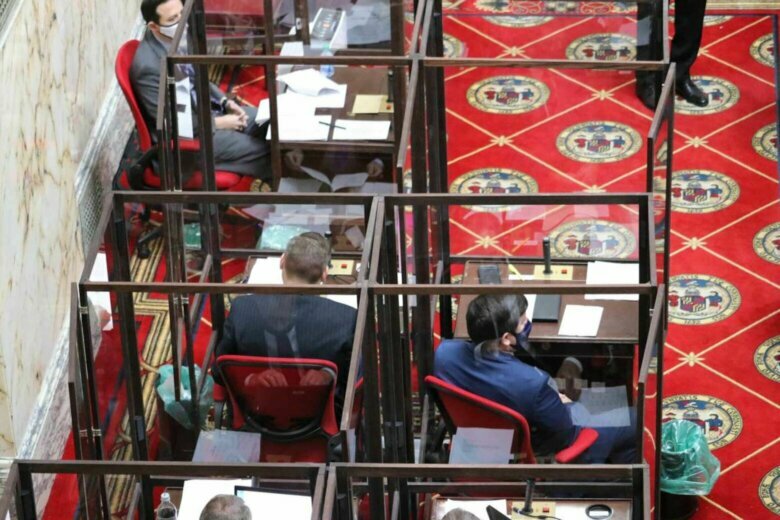This article was republished with permission from WTOP’s news partners at Maryland Matters. Sign up for Maryland Matters’ free email subscription today.

This content was republished with permission from WTOP’s news partners at Maryland Matters. Sign up for Maryland Matters’ free email subscription today.
The Maryland Senate moved quickly Friday to override 16 of the vetoes that Gov. Lawrence J. Hogan Jr. (R) handed down following the 2020 General Assembly session.
The bills dealt with a range of issues, from public safety to health care to business development.
The Senate put off debate for at least a week on the most controversial of Hogan’s vetoes, including his decision to nix the Blueprint for Maryland’s Future, a comprehensive and expensive education reform plan.
Senate President Bill Ferguson (D-Baltimore City) told reporters Friday that the Senate decided to hold off on debating Hogan’s veto of bills with a significant fiscal impact or those that passed last year without significant bipartisan support. Ferguson said it would be important to assess the governor’s annual budget proposal, which will be released next Wednesday, before acting on some of the costlier measures.
“We wanted to take them up when there was a bit more information,” he said.
On Friday, senators dispatched with 13 of the vetoed bills swiftly, voting to override those vetoes in one package, on a party-line 30-15 vote ― even though some Republicans had supported many of the measures last year that Hogan subsequently vetoed.
“These are all bills that passed with bipartisan support,” Ferguson observed. “Unfortunately, that didn’t happen today.”
Lawmakers spent some time debating three public safety measures that Hogan had vetoed ― SB 708, which would require at least $3 million to be set aside annually for the Maryland Violence Intervention and Prevention Program; SB 907, which would set guidelines for the Maryland State Police to coordinate with local law enforcement agencies; and SB 929, which would take responsibility for patrolling certain highways in Baltimore City away from the Baltimore Police Department and extend it to other law enforcement agencies, to make more city cops available for street patrols.
On these three bills, Republicans said the spike in violent crime in Maryland required a tougher approach to law enforcement ― or they expressed unhappiness with changes the House made to the legislation during the truncated 2020 legislative session after the measures passed out of the Senate.
Sen. Robert Cassilly (R-Harford) referred to the bill on Baltimore City traffic enforcement as “an attempt by this body to micro-manage law enforcement to an unprecedented degree.”
“We are not policing experts, and we need to stop playing top cop,” he said.
Democrats acknowledged that while the bills under consideration were not perfect solutions for preventing and fighting crime, they represented small but measurable steps that would help the community.
“I don’t think $3 million is too much to ask for when the issue is saving people’s lives,” said Sen. Jill P. Carter (D-Baltimore City), the sponsor of the bill on the violence intervention and prevention program.
The Senate wound up overriding all three vetoes on a party-line 30-15 vote. Two Democrats were absent from the chamber.
Among the other bills that the Senate voted to override was a measure providing funding for the state’s new Prescription Drug Affordability Board. While the legislature established the board, which is to consider ways to keep prescription drug prices low, in 2019, the funding component to stand up the office wasn’t approved until 2020 ― when Hogan vetoed the bill.
“The board has already started its work with preliminary funding and is doing a great job exploring the impact of rising drug costs across the state,” Vincent DeMarco, president of the Maryland Citizens Health Initiative, said in a statement following the veto override. “And other states are following our lead by moving to create similar boards. Establishing permanent funding for the board will guarantee it has the resources it needs to effectively address the issue of rising drug costs.”
The other vetoed bills that the Senate overrode Friday:
- SB 148, which would change certain requirements for the state government to acquire land;
- SB 226, which would modify certain prohibitions on billboards along highways;
- SB 398, which would establish the Maryland Small Business Innovation Research and Technology Transfer Incentive Program;
- SB 407, which would establish a unit in the Attorney General’s office to protect senior citizens from financial crimes;
- SB 452, which would set minimum funding levels for state family assistance programs;
- SB 465, which would set funding levels for the Maryland E–Nnovation Initiative Program;
- SB 493, which would increase the minimum funding level for the Small Business Development Center Network Fund;
- SB 524, dealing with public library fines and capital expenditures;
- SB 796, which would make program changes to the state’s Developmental Disabilities Administration;
- SB 845, which would provide funding for the Maryland Corps Program, a service program for students set up by legislation in 2016 but never funded;
- SB 877, which would revise the state’s Underground Facilities Damage Prevention Program; and
- SB 985, which would establish a local farm enterprise program within the state Department of Agriculture.
Under the abbreviated legislative schedule brought on by the COVID-19 outbreak, the House is not expected to begin taking up Hogan’s vetoes until Feb. 8.
jkurtz@marylandmatters.org








